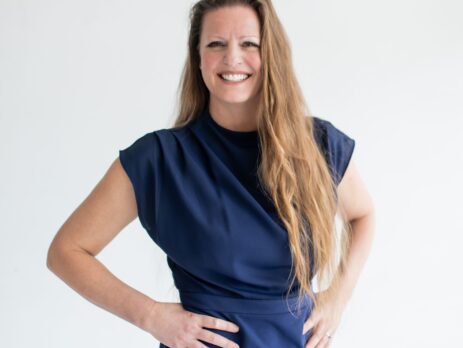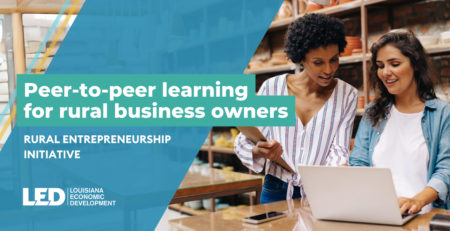Ever dream of launching a startup but worried about funding? Our Senior Financial Analyst, Julie Gilley Milam sees countless entrepreneurs with “great ideas” and “good business acumen,” but one crucial skill gap: understanding how to raise capital. This article explores the program’s role in bridging that gap and empowering startups.
Startup businesses take a lot. They take innovative ideas. They take passion. They take dedication and determination. They take time.
And they take money.
Aspiring entrepreneurs often need help with financing their dream. For startups in North Louisiana, BRF’s Entrepreneurial Accelerator Program (EAP) is available to help navigate that financial world.
“A lot of entrepreneurs have great ideas,” said Julie Gilley Milam, Senior Financial Analyst with EAP. “They might even have good business acumen, but they’ve never raised capital before. They really only know the money they have in their own bank account or taking out a loan. They don’t know much about what we call private equity or angel investing.”
“We help educate them on how it works, the process, the vocabulary. We advocate on their behalf to help them secure a deal that is attractive to investors but also helps them be successful and get to a certain dollar amount of capital.”
Milam explained that when a startup comes to EAP with an idea, the analysts come alongside the entrepreneur to walk them through what she called “the life cycle of a startup.”
“Initially, in the idea phase, many entrepreneurs will bootstrap it or self-fund that phase, or have a friends and family round of financing,” she said. “Then, once they go into the prototyping phase, that’s when they may continue to self-finance or raise capital with friends and family. But sometimes angel investors will jump in at the prototyping phase. That’s what we would call seed capital. From there, as they get into a growth phase, that’s when angel investors tend to come in on a series A, B, C, etc.”
She said that finding the right financing becomes critical between the prototyping phase and the growth phase, because that’s often where danger lies.
“From prototyping into that growth phase is something we call the ‘Valley of Death,’” Milam said. “That’s where many startup companies fail, because typically they run out of money. That’s where angel investors step in to really help bridge them through that Valley of Death and get them to where they are cash-flow positive and generating a lot of revenue.”
Part of EAP’s role is to explain the different types of investments a startup can attract to raise the capital they need, including capital raised through angel investors and potentially venture capital.
“In the angel investing world, there are multiple rounds of investments that typically happen for a startup,” she said. “An angel investor could do a seed round, which is normally that first organized money that comes in. Then the next round is an A round, then a B round, then a C round.”
“Venture capital comes a little bit later. That’s your BlackRocks and large venture capital firms that can provide much larger investments. Typically, by that point, that’s a startup that is already cash-flow positive or they’re really in a growth mode and they are bringing on larger investments. Those rounds could be in the $30 million plus range.”
EAP works with its client startup wherever they are on the spectrum, whether they are looking to build a prototype of their invention, develop their business plan or secure that investment to carry them through the Valley of Death and into a growth mode.
“EAP helps them regardless of what stage they are in,” Milam said. “If they are just trying to organize their idea. Or they’ve invented this really cool medical device, but they haven’t prototyped it. Maybe they haven’t even figured out what their business model is — we have analysts here at EAP who can get them to the right people.”
EAP also works to match investors with startups for mutually beneficial relationships.
On investment opportunity, EAP works with the New Louisiana Angel Funds (NLAF) – North Louisiana’s first accredited angel investment funds, of which BRF is the managing member. Local accredited investors make all of the investment decisions. Milam said NLAF 3, the third of the NLAF funds, is a seed- and early-stage investment fund for startups.
“It might not always be the first money in, but it’s going to be very early stage,” she said. “We tell investors as they are making the decision to join the fund it is a higher risk asset class to invest in, but it does have the potential for a higher return.”
Milam said that capital from NLAF 3 and other angel funds often comes with additional benefits for the startup.
“Most of the time, if a company receives an investment from the fund, we negotiate a board position,” she said. “Normally one of the investors holds that seat. That is an invaluable benefit to the company. They get an experienced investor who has a ton of entrepreneurial experience who sits on their board and can offer guidance and advice.”
After navigating the Valley of Death and securing early funding, EAP continues to walk with the entrepreneur to whatever ultimate goal they have, including acquisition by a larger company.
“They don’t graduate from EAP,” Milam said. “We don’t break up. We’re always there. As they mature, new and different opportunities and potential problems come along. We can help them figure it out. A lot of accelerators say, ‘You’ve been through our 16-week program, now go do great things.’ The EAP team will be there for the duration.”
If you have an idea for a startup company or an invention and are looking for help to launch, look no further than Shreveport’s own EAP.
EAP, a division of BRF, diversifies the regional economy and creates jobs by providing services to innovative startups that have high-growth potential. EAP has helped create almost 700 jobs, and its portfolio companies have an annual payroll of $21.5 million. EAP has screened more than 1,600 ideas and provided services to more than 485 companies that have raised $218 million in capital. For more info, visit www.EAPLA.com.




